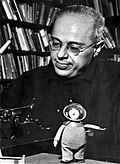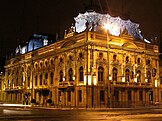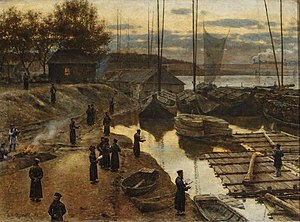
Back بوابة:بولندا Arabic Portal:Polşa Azerbaijani Портал:Полша Bulgarian دەروازە:پۆڵەندا CKB Portál:Polsko Czech Portal:Polen German Portal:Polonya DIQ Πύλη:Πολωνία Greek Portalo:Pollando Esperanto Portal:Polonia Spanish
Welcome to the Poland Portal — Witaj w Portalu o Polsce

 Poland is a country in Central Europe, bordered by Germany to the west, the Czech Republic to the southwest, Slovakia to the south, Ukraine and Belarus to the east, Lithuania to the northeast, and the Baltic Sea and Russia's Kaliningrad Oblast to the north. It is an ancient nation whose history as a state began near the middle of the 10th century. Its golden age occurred in the 16th century when it united with the Grand Duchy of Lithuania to form the Polish–Lithuanian Commonwealth. During the following century, the strengthening of the gentry and internal disorders weakened the nation. In a series of agreements in the late 18th century, Russia, Prussia and Austria partitioned Poland amongst themselves. It regained independence as the Second Polish Republic in the aftermath of World War I only to lose it again when it was occupied by Nazi Germany and the Soviet Union in World War II. The nation lost over six million citizens in the war, following which it emerged as the communist Polish People's Republic under strong Soviet influence within the Eastern Bloc. A westward border shift followed by forced population transfers after the war turned a once multiethnic country into a mostly homogeneous nation state. Labor turmoil in 1980 led to the formation of the independent trade union called Solidarity (Solidarność) that over time became a political force which by 1990 had swept parliamentary elections and the presidency. A shock therapy program during the early 1990s enabled the country to transform its economy into one of the most robust in Central Europe. With its transformation to a democratic, market-oriented country completed, Poland joined NATO in 1999 and the European Union in 2004, but has experienced a constitutional crisis and democratic backsliding since 2015.
Poland is a country in Central Europe, bordered by Germany to the west, the Czech Republic to the southwest, Slovakia to the south, Ukraine and Belarus to the east, Lithuania to the northeast, and the Baltic Sea and Russia's Kaliningrad Oblast to the north. It is an ancient nation whose history as a state began near the middle of the 10th century. Its golden age occurred in the 16th century when it united with the Grand Duchy of Lithuania to form the Polish–Lithuanian Commonwealth. During the following century, the strengthening of the gentry and internal disorders weakened the nation. In a series of agreements in the late 18th century, Russia, Prussia and Austria partitioned Poland amongst themselves. It regained independence as the Second Polish Republic in the aftermath of World War I only to lose it again when it was occupied by Nazi Germany and the Soviet Union in World War II. The nation lost over six million citizens in the war, following which it emerged as the communist Polish People's Republic under strong Soviet influence within the Eastern Bloc. A westward border shift followed by forced population transfers after the war turned a once multiethnic country into a mostly homogeneous nation state. Labor turmoil in 1980 led to the formation of the independent trade union called Solidarity (Solidarność) that over time became a political force which by 1990 had swept parliamentary elections and the presidency. A shock therapy program during the early 1990s enabled the country to transform its economy into one of the most robust in Central Europe. With its transformation to a democratic, market-oriented country completed, Poland joined NATO in 1999 and the European Union in 2004, but has experienced a constitutional crisis and democratic backsliding since 2015.
From Polish history –
Selected biography –
Selected location –
Did you know –
- ... that underground courier Frumka Płotnicka (pictured), who delivered weapons and instructions for making Molotov cocktails and hand grenades to Jews in Nazi-occupied Poland, died in the Będzin Ghetto uprising?
- ... that Polish football player Łukasz Cieślewicz was named player of the year in the Faroe Islands in 2011 and 2015?
- ... that the type fossil of the damselfly Electropodagrion belongs to the Museum of Amber Inclusions of the University of Gdańsk?
- ... that the painter Bronisława Janowska rejected a marriage proposal from the man she loved because he was divorced?
Poland now
Recent events
- Poland won 10 medals, including one gold, at the 2024 Summer Olympics, ranking 42nd in the medal table.










- On 11 August, Daria Pikulik won a silver medal in track cycling.
- On 10 August, Poland men's team won a silver medal in volleyball, while Julia Szeremeta won a silver medal in boxing.
- On 7 August, Aleksandra Mirosław (pictured) and Aleksandra Kałucka won, respectively, gold and bronze medals in speed climbing.
- On 1 August, Russian–Spanish journalist Pablo González Yagüe, arrested in Poland on espionage charges and held in pre-trial detention for 886 days, was released as part of a multinational prisoner exchange.
- On 9 July, Jerzy Stuhr, a prominent theatre and film actor and director, died at the age of 77.
Ongoing
Constitutional crisis • Belarus–EU border crisis • Ukrainian refugee crisis
Holidays and observances in August 2024
(statutory public holidays in bold)
- Assumption Day and Polish Armed Forces Day (military aircraft pictured), 15 April
- Solidarity and Freedom Day, 31 August
Selected image –
Subcategories
You can help!
Topics
Related portals
| Belarus | Czech Republic | Germany | Lithuania | Russia | Slovakia | Ukraine |
| Europe | Catholicism | Communism | European Union |
Associated Wikimedia
The following Wikimedia Foundation sister projects provide more on this subject:
-
Commons
Free media repository -
Wikibooks
Free textbooks and manuals -
Wikidata
Free knowledge base -
Wikinews
Free-content news -
Wikiquote
Collection of quotations -
Wikisource
Free-content library -
Wikiversity
Free learning tools -
Wikivoyage
Free travel guide -
Wiktionary
Dictionary and thesaurus
Wikipedias in the languages of Poland
| Kaszëbskô Wikipedijô Kashubian Wikipedia |
Polska Wikipedia Polish Wikipedia |
Ślůnsko Wikipedyjo Silesian Wikipedia |
Wymysiöeryś Wikipedyj Vilamovian Wikipedia Incubator |
Беларуская • Česky • Deutsch • Հայերեն • Lietuvių • Romani • Русский • Slovenčina • Українська • ייִדיש
© MMXXIII Rich X Search. We shall prevail. All rights reserved. Rich X Search






























